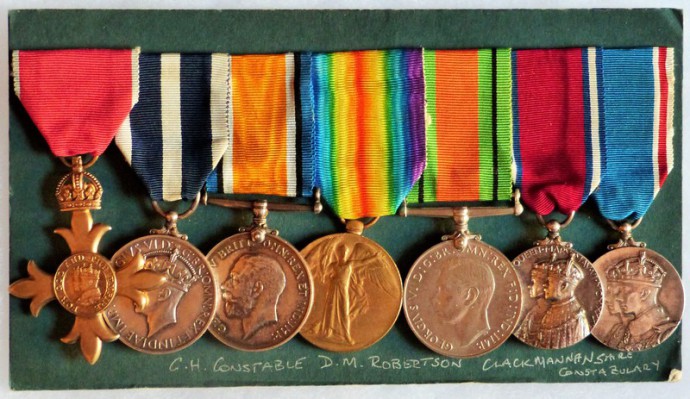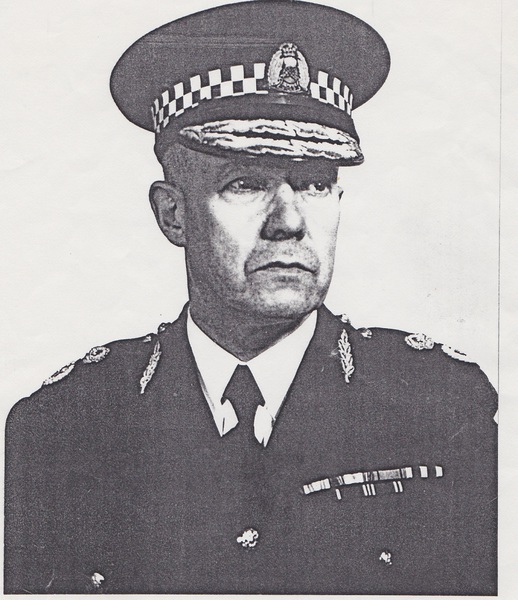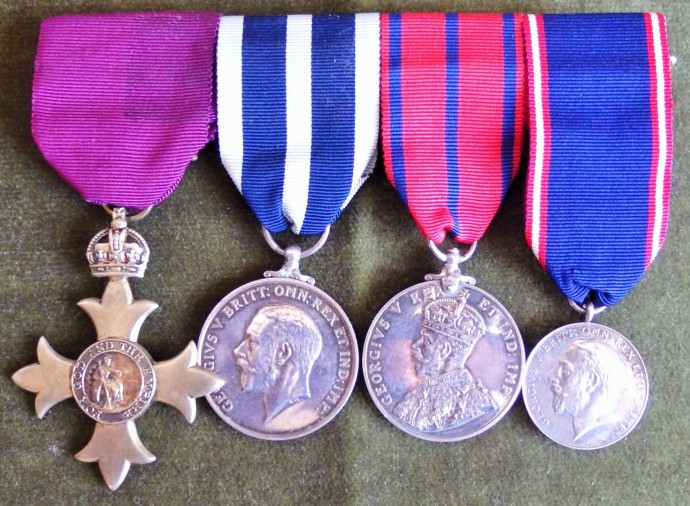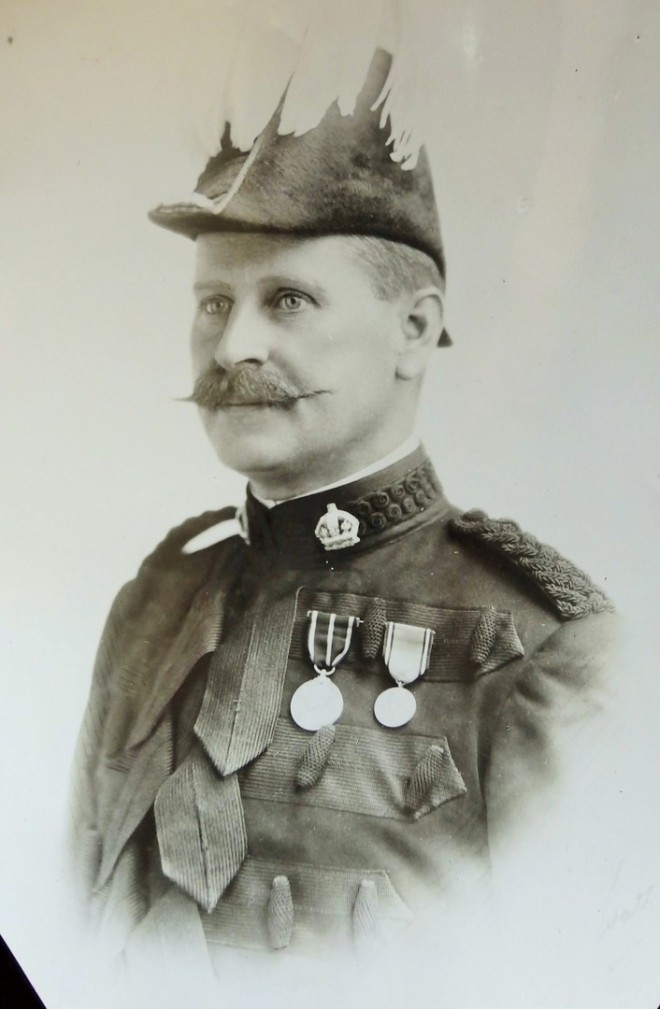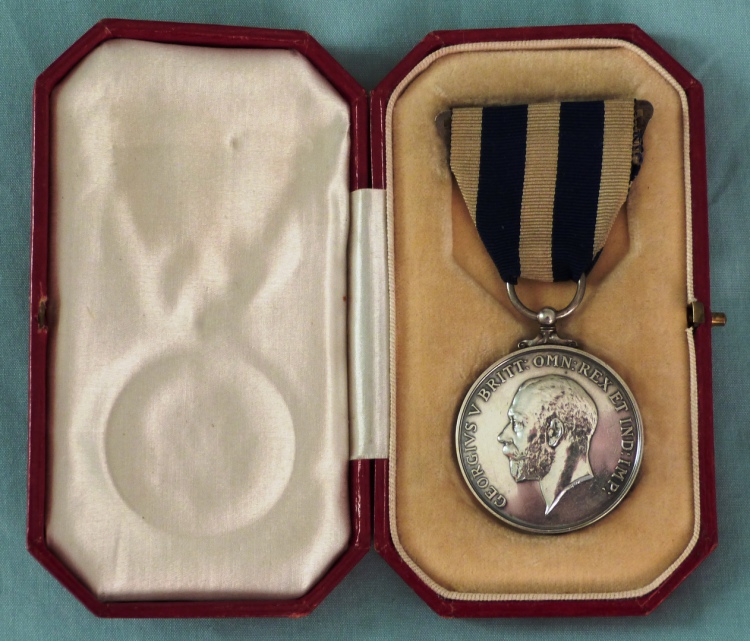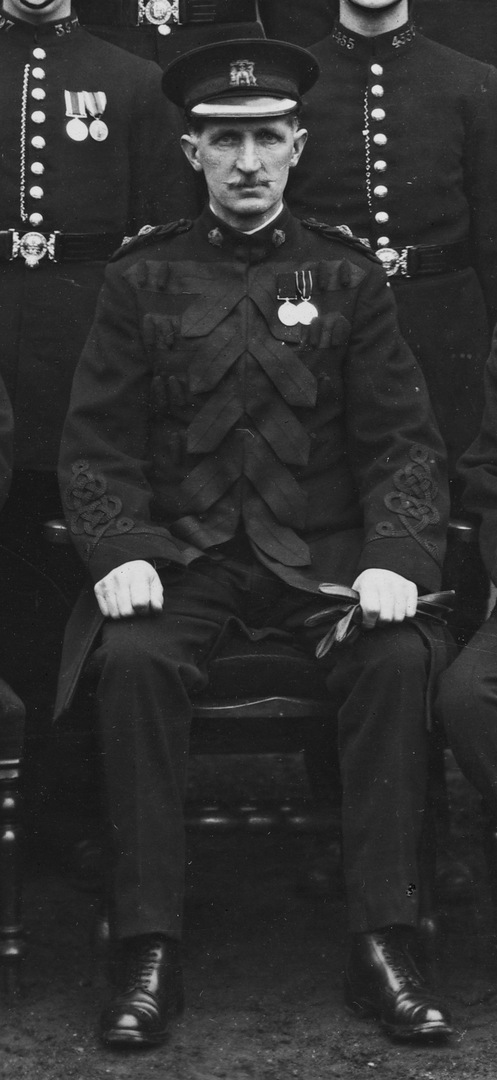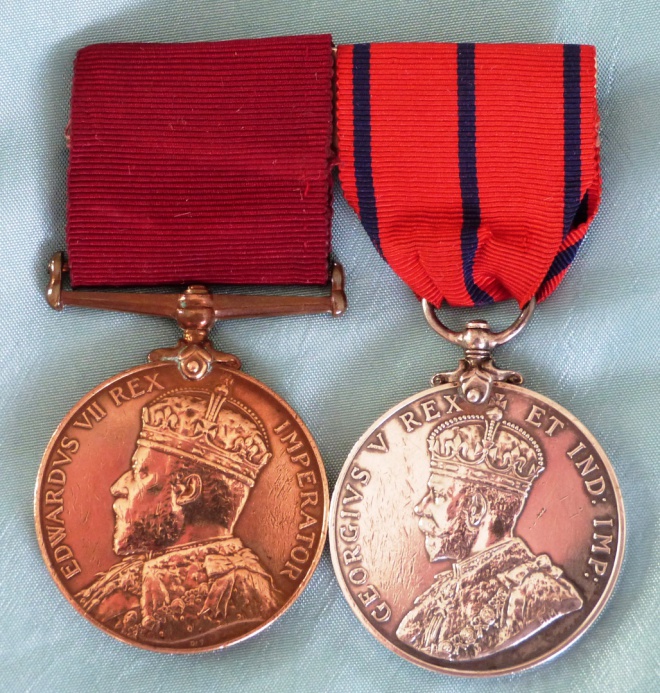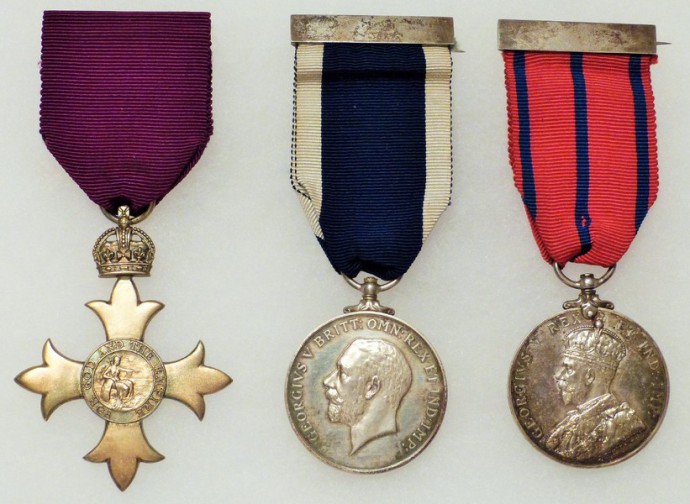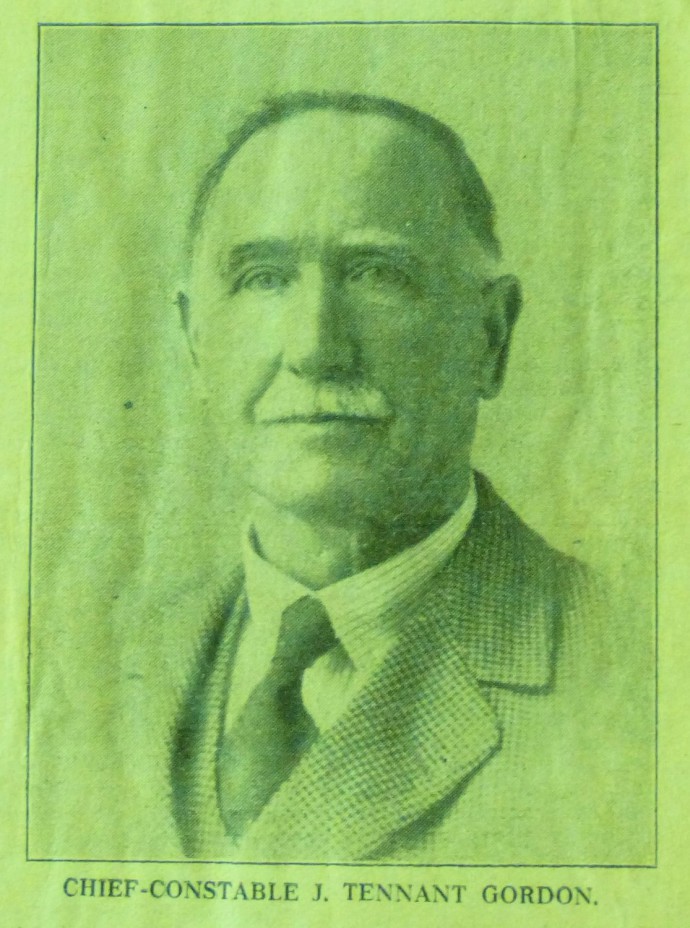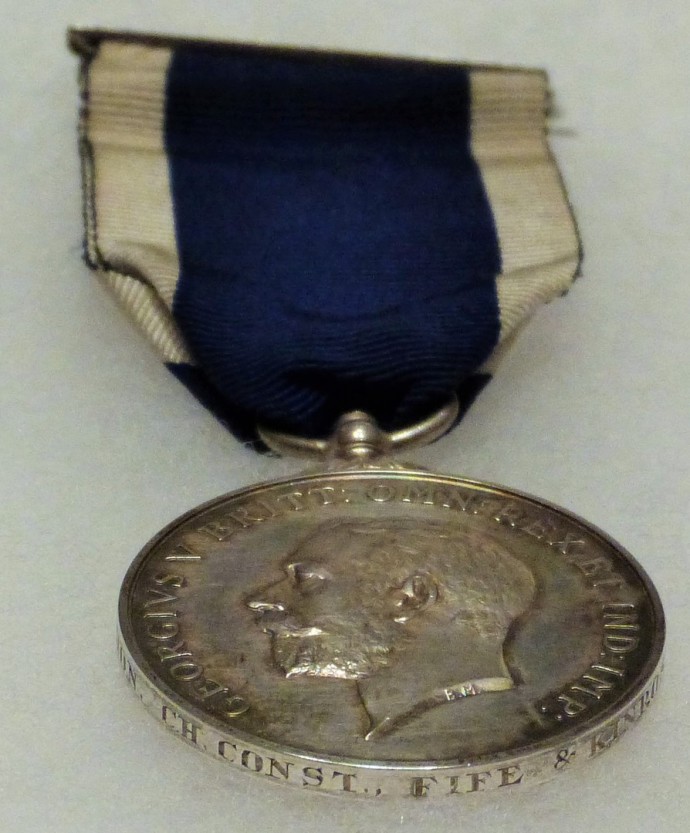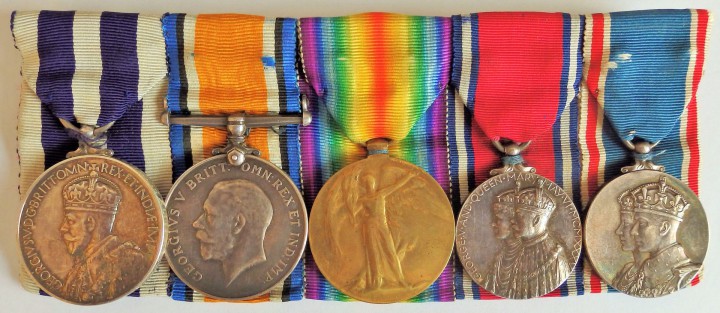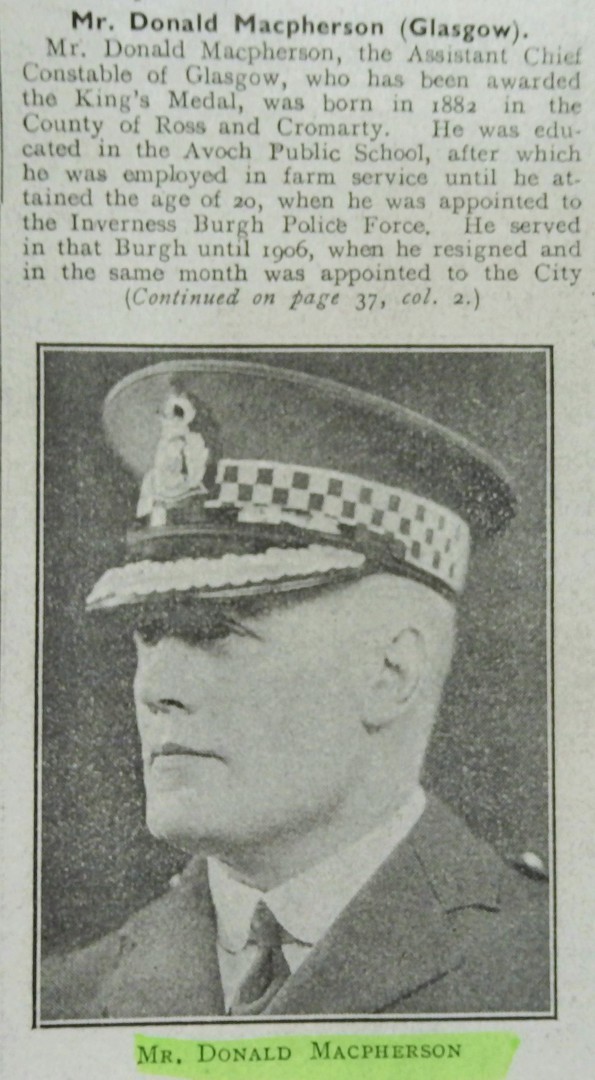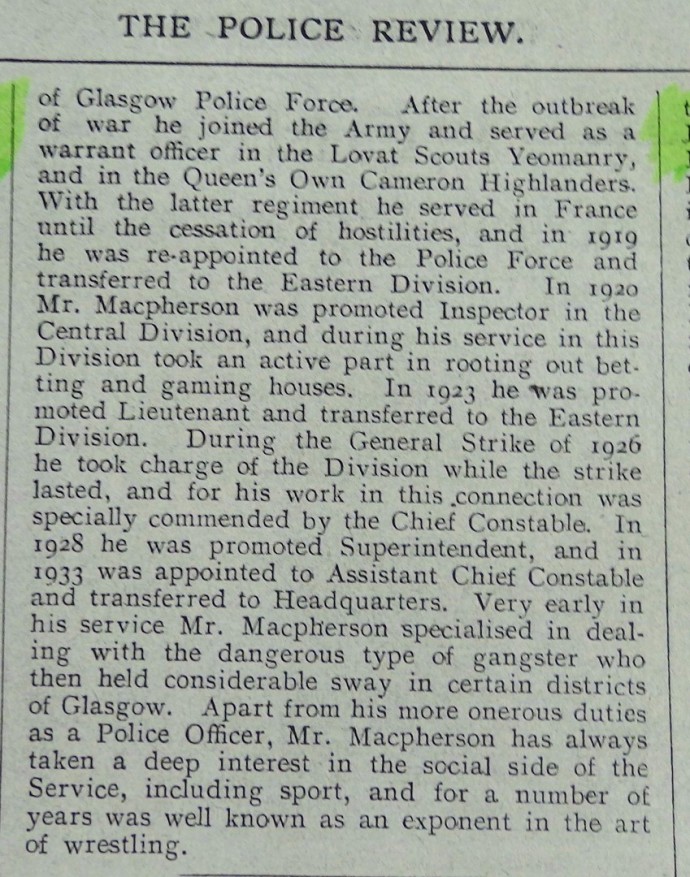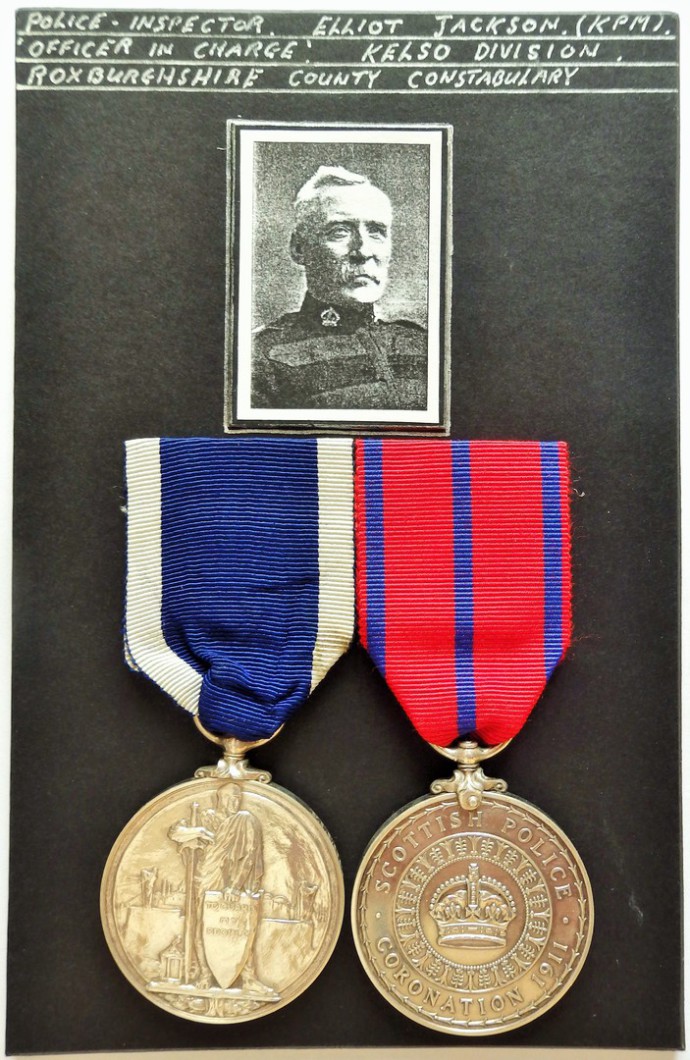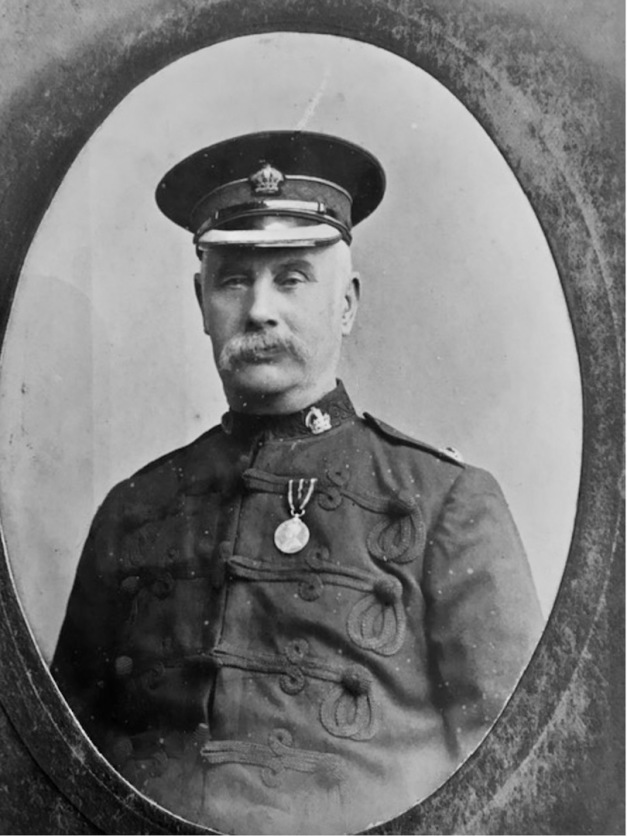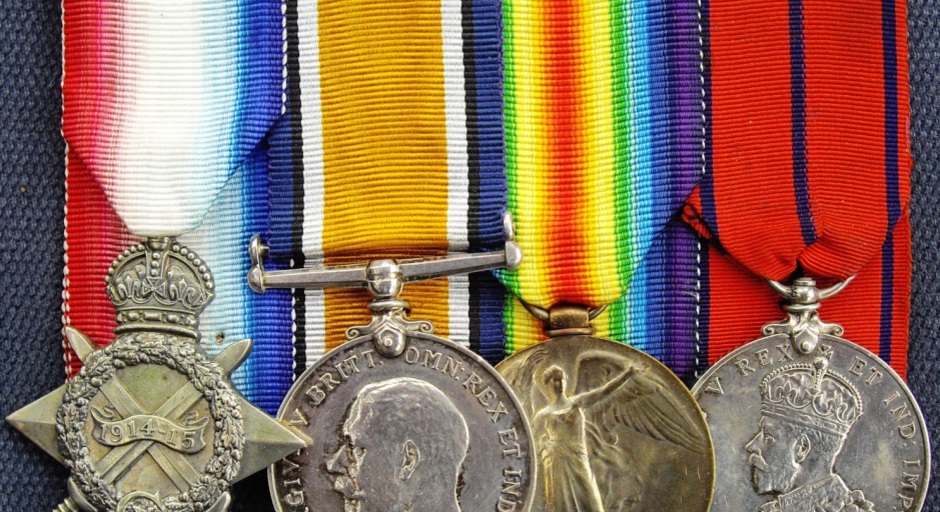
The King's Police Medal for Distinguished Conduct
Clackmannanshire County Police: Chief Constable David Muir Robertson OBE KPM
Order of the British Empire (1949)
King’s Police & Fire Service Medal (1945)
British War Medal
Victory Medal
Defence Medal
King George V Jubilee Medal, 1935
King George VI Coronation Medal, 1937
Clackmannan County Police
David Muir Robertson
David Muir Robertson was born in Tullibody, Clackmannanshire on 27 January, 1893 and joined Clackmannan County Police on 12 May 1913.
He served in the Scottish Horse Field Ambulance and the Royal Army Medical Corps between 12 April, 1915 and 1919, re-joining the force on 7 January 1919. He was awarded the British war Medal and Victory Medal and these are confirmed in his Medal Index Card (MIC) and on the RAMC Medal Roll in W 329/2078 at the National Archives.
He was promoted to Sergeant on 21 April, 1921 and Inspector on 16 May 1930 when the force amalgamated with Alloa Burgh Police.
On the Retiral of Chief Constable John Scott in 1932, David Robertson became Chief Constable on 29 October that year.
His name is on the Medal Rolls for the 1935 Jubilee and 1937 Coronation Medals.
David Robertson was awarded the King’s Police and Fire service Medal in the Victory Honours List of 1945 for his Meritorious Service in organising the Air Raid Precautions activity in an area of considerable armaments production.
In January, 1949, David Robertson was made an Officer of the Order of the British Empire.
When Clackmannan County Police amalgamated with Stirling County Police in May 1949, David Robertson briefly took command of the Northern Division but retired on 31 December that year.
In May, 1953, David Robertson was appointed as an Honorary Sheriff-Substitute in Alloa Sheriff Court.
Mr Robertson died in Alloa on 26 June, 1963.
To read the obituary taken from the local papers, please click here.
Dundee City Police: Chief Constable John Carmichael OBE KPM JP
Order of the British Empire (1928)
King’s Police Medal (1925)
King George V Coronation (Scottish Police) Medal 1911
Royal Victorian Order in Silver (1914)
John Carmichael, the son of a policeman, was born in Lanarkshire about 1851.
He joined the police force in 1882 and in 1885, joined Dundee City Police. His promotion was rapid, he became a Sergeant in 1887, an Inspector in 1890, a Lieutenant in 1892 and Deputy Chief Constable in 1894.
After 15 years as Deputy, he was appointed Chief Constable of Dundee City Police in 1909.
On the occasion of the Coronation of King George V in 1911, John Carmichael received the Police Coronation Medal.
In July, 1914, the King paid an official visit to Scotland, and on this visit he went to Dundee amongst other cities. For his services on this occasion, Chief Constable Carmichael was awarded the Royal Victorian Medal in Silver.
He was awarded the King’s Police Medal at the end of 1924, the award being notified in the London Gazette of 1 January 1925.
His citation read:
“Has completed 42 years’ service which has been distinguished by very exceptional merit and ability and during which he has gone through all the grades of the force.
He was specially commended by the War Office for service during the War and his conduct in the Detective Department has been marked by great ability and success.”
Chief Constable Carmichael was invested with his King’s Police Medal on 12 February 1925 at Buckingham Palace by King George V.
Carmichael was appointed an Officer of the Order of the British Empire (Civil), this award being notified in the London Gazette of 4 June 1928.
He was married to Margaret Grant and they had one son and three daughters.
He was an Elder in Rye Hill Church and a Justice of the Peace for the County and City of Dundee.
Chief Constable John Carmichael, OBE, KPM, JP, died in Fernbrae Nursing Home in Dundee on 4 August, 1931, aged 66. The funeral was 6 August, 1931 and he was buried in the Western Cemetery. Being held in great esteem, many thousands lined the streets of Dundee at the funeral.
(Some of the above detail is extracted from the (Dundee) Courier and Advertiser of 5, 6 and 7 August, 1931.)
I am grateful to Ian Hall for permission to use the images and biographical details above.
Edinburgh City Police: Superintendent Hugh Calder KPM
King's Police Medal (1 January, 1925)
King Edward VII Police (Scotland) Medal 1903
King George V Coronation (Scottish Police) Medal 1911
Edinburgh City Police
Superintendent Hugh Calder KPM
Superintendent C Division Braid Place Police Station
Hugh Calder was believed to be born in Assynt in Sutherland around 1868 but I can find no record of his birth that has the names of his parents as given on his Marriage Certificate.
He did, however, join Edinburgh City Police on 20 November, 1888. Sometime in 1890, he stopped a runaway horse and his reward for this meritorious conduct was to gain and “Advancement in his pay” six months earlier than was usual.
In 1899, he married Mary Montgomery MacDonald in Edinburgh. They had two sons together, Godfrey born in 1900 and Allan born in 1903.
He was an excellent piper and keen on athletics. I have an engraved flask awarded to “PC H Calder” by “E.C.P.S.C” (Edinburgh City Police Sports Club) which could only have been awarded between 1888 and 1900 since on 3 July, 1900, he was promoted to Police Sergeant.
Like most of Edinburgh City Police, he was awarded the King Edward VII Police (Scotland) Medal, 1903 for the Royal Visit to Edinburgh.
According to the Edinburgh City Police weekly Record of 13 March, 1906:
|
“Station Sergeant Hugh Calder promoted to 3rd Class Inspector, vice Insp. George Nicol promoted. All as from 16th instant.”
|
He had joined the Edinburgh City Police Pipe Band and was Pipe Sergeant around this period.
He was also awarded the King George V Coronation (Scottish Police) Medal, 1911 along with the rest of the force and was presented with the medal in 1912.
By 1912, he was Pipe-Major of the band. According to ‘The Scotsman’ newspaper of Monday September 2nd, 1912 in a report on the Cowal Highland Games of the previous Saturday:
|
“In the civilian pipe band contest for the “Harry Lauder” shield, the winners were Edinburgh City Police Pipe Band (Pipe-Major Insp. Hugh Calder): Dr Kelso’s Lothian Pipers were second; while Stonehouse Pipe Band took third place.
In handing over the shield, Mr Harry Lauder said he was sure when he went to Edinburgh he would be all right as the police had got his shield (Laughter). He was sure of a wink in the passing anyway. (Laughter)
|
On 2nd January, 1917, the Weekly Record shows that:
|
Awards for Meritorious Conduct |
|
|
Inspector Hugh Calder
PC 24 John F. Laing
PC 114 Alexander Fullerton
|
Commended for energy and vigilance displayed in effecting the arrest of a known thief and hooligan who was subsequently convicted under the Prevention of Crimes Act. |
On 21 May 1918, he was transferred from “C” (Braid Place) to “A” (High Street) Division.
On 16 June 1919, an entry in the weekly Record stated:
|
“Inspector H. Calder promoted to the rank of Superintendent and transferred to “C” Division vice Supt. Peacock transferred.
To take effect as from this date.”
|
According to a Supplement to the London Gazette of 1 January 1925:
|
Whitehall, 31st December, 1924
His Majesty the KING has been graciously pleased to award the King’s Police Medal to the officers of Police and Fire Brigades whose names appear below:
Hugh Calder, Superintendent, Edinburgh City Police.
|
According to “The Scotsman” of Thursday 2 January, 1930:
|
EDINBURGH POLICE Promotions Announced
Inspector D. Ross of Edinburgh City Police, has been promoted to Superintendent of the South Side Division, Superintendent Hugh Calder having retired on pension after completing 41 years’ service.
Superintendent Calder is one of the best known men in the force, a native of Sutherland, he joined the City Police in 1888. Mr Calder is a keen piper, and for a time was pipe-major of the City Police Band.
Other promotions are:-
Sergeant John Pearce to be Inspector in charge of the Aliens Department at Headquarters.
Detective Constable Robert Gibson to be Detective Sergeant.
Constable William Merrilees to be Sergeant at Headquarters.
Constables Walter Hill and William Milton, West End to be Sergeants.
|
On 21 September, 1935, Hugh Calder was elected to be an office-bearer in the Highland Pipers Society of Edinburgh.
On Thursday October 28, 1937, “The Scotsman” reported:
|
Death of Retired Police Superintendent
“The death took place yesterday at 13 Primrosebank Road, Edinburgh, of Mr Hugh Calder, a former Superintendent in the Edinburgh City Police.
Mr Calder who retired on reaching the age limit about seven or eight years ago, rose from the rank of Constable in the Edinburgh Police service and acted as Licensing Inspector before being appointed Superintendent of what was “C” Division at Braid Place, before the re-organisation scheme took place two or three years ago following the introduction of the police box system.
Mr Calder, who was an efficient officer, took a keen interest in athletics and piping, and while he was Pipe-Major of the Edinburgh City Police Pipe Band they twice won the World’s Championship at Cowal.”
|
Mary Montgomery Macdonald or Calder died on 22 June, 1946 at the Eastern General Hospital, Edinburgh. Her usual address was in Thirlstane Road, Edinburgh.
Fife and Kinross Constabulary: Chief Constable James Tennant Gordon OBE KPM JP
Officer of the British Empire (GVR)
King's Police Medal (GVR)
King George V Coronation (Scottish Police) Medal 1911
Fife and Kinross Constabulary
Chief Constable James Tennant Gordon OBE KPM
James Tennant Gordon was born in Monymusk in the County of Aberdeen in 1865.
He joined Ayrshire Constabulary on 1 November 1884 and was promoted to Sergeant on 26 October 1891.
In 1895, he transferred to Hamilton Burgh Police as Inspector and Deputy Chief Constable.
Later that year, he was appointed Superintendent and Deputy Chief Constable of the County of Wigtownshire Police.
In June 1898, he was appointed Chief Constable of Banffshire Constabulary.
He was appointed Chief Constable of Fife and Kinross in December 1903. He commenced his duties on 16 January 1904.
After Local Government reorganisation in 1929, he ceased responsibility for Kinross when it was transferred to Perthshire.
James Tennant Gordon died in office while playing golf with the Provost of Cupar at Eden Sands Golf Course in St Andrew's on 24 November 1934.
City of Glasgow Police: Deputy Chief Constable Donald MacPherson KPM
Roxburghshire Constabulary: Inspector Elliot Jackson KPM
The King's Police Medal (1913)
The King George V Coronation (Scottish Police Medal), 1911
Roxburghshire Constabulary
Inspector Elliot Jackson
Elliot Jackson was born in Castleton, Roxburghshire about 1851.
He joined Roxburghshire constabulary on 4 October, 1871. He was promoted to Police Sergeant after about 10 years. On18 October, 1884, he was promoted to Inspector and Head of Kelso Division, a position he held for 27 years.
According to the Chief Constable, John Morren,
“He retired on pension on 16 January, 1912 with an unblemished record of over 40 years’ service to his credit, the whole of which service was marked by conspicuous ability, and an unflagging zeal and devotion to duty.
On one occasion he was specially rewarded for energy, tact and perseverance displayed in the performance of duty, and, among other meritorious acts, the following case in which he acted with exceptional courage and diplomacy may be mentioned.”
The following is a very brief summary of a small section of three page report by Chief Constable Morren in which he recommends Ex-Inspector Jackson for the King's Police Medal. It does not do justice to the courage and devotion to duty of either police officer involved.
“On 13 April, 1901, Inspector Jackson received information that a local landowner, a few miles from Kelso had become insane and was in a highly dangerous condition armed with a loaded revolver and various other firearms.
He was to accompany two local doctors, Dr Rutherford and Dr McRae, two asylum attendants and Police Sergeant Smail, to remove the man to an asylum.
When planning how to effect the securing of the man, neither the Doctors nor the Asylum Attendants would enter the grounds. A new Valet had been employed and it was decided that he should try to administer a draught supplied by the Doctors to incapacitate the man.
On entering the grounds of the estate, the Valet encountered the Landowner stalking the perimeter armed with a rifle.
Despite the fact that earlier in the day, the man had telephoned Kelso Police Station several times and threatened to “blow out the Inspector’s brains”, Inspector Jackson and PS Smail used their wits to gain access to the house while facing the same man armed with a loaded rifle.
At a pre-arranged signal, they grabbed the man by both arms and after a severe and desperate struggle, he was overpowered and disarmed.
Besides the rifles and loaded revolver, another fully loaded revolver was found in his coat pocket while his other pockets were crammed with cartridges.
All the firearms were loaded and the walls, doors and windows of the house were riddled with bullets which the man had fired at imaginary antagonists.
The man was so violent it proved impossible to move him to the asylum in Edinburgh until the next day.
The man was later removed to England and on 22 November, 1902, at the Hampshire County Assizes in Winchester, he was found guilty of the Unlawful Wounding of a Police Constable by shooting him.”
Elliot Jackson became the Librarian in Kelso Public Library upon his retirement. He was awarded the King's Police Medal on 1 January, 1913.
He died aged 62 on 9 November, 1913 in the Public Library House, Kelso. His son John E. Jackson registered his death.
I am grateful to Ian Hall for permission to use the images and biographical details above.
